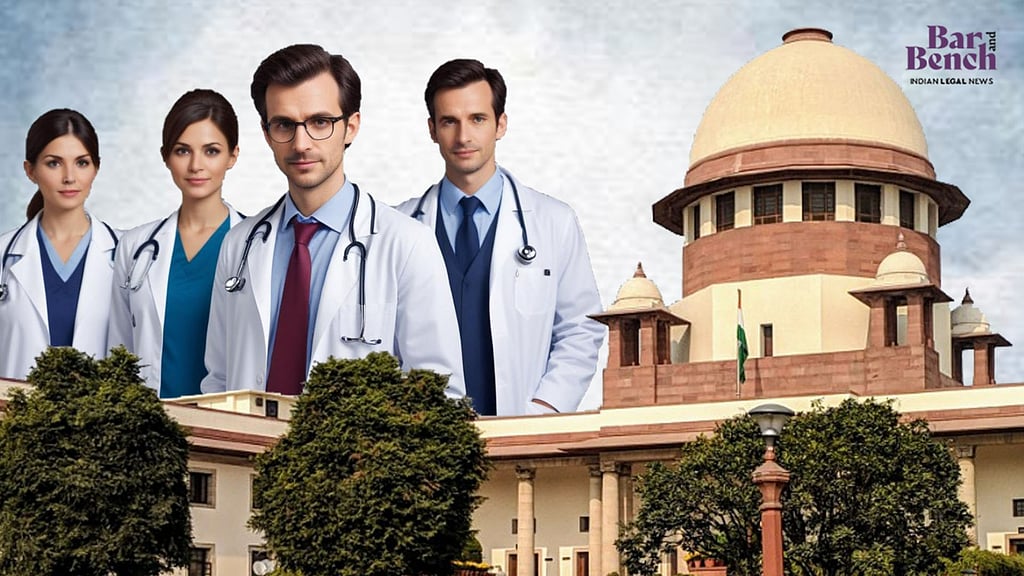The Supreme Court on Friday held that the National Medical Commission (NMC) guidelines governing eligibility to pursue the MBBS course, specifically the requirement to have “both hands intact”, needs revision. [Anmol v. Union of India]
A bench of Justices BR Gavai and KV Viswanathan noted that such guideline was against the principles of the Rights of People with Disabilities Act as well as Article 41 of the Constitution, which imposes a duty upon the State to make effective provision for securing the right to work and education for persons with disabilities.
“In our view, this prescription of “both hands intact…” is completely antithetical to Article 41 of the Constitution; the principles enshrined in the United Nations Convention on the Rights of Persons with Disabilities and the salutary provisions of the RPwD Act. It also indicates a classification which is overbroad and glorifies ‘ableism’. It propagates that persons with typical abilities and with faculties similar to what the majority may have or somehow superior.”

The Court was considering a case of a student who qualified the National Eligibility cum Entrance Test (NEET) 2024 but was denied admission as he did not fulfil the eligibility criteria under the NMC guidelines.
The appellant has locomotor disability of 50% as well as speech and language disability of 20%. The final disability computed was 58%. He had approached the Government Medical College, Chandigarh for having his disability assessed. Without assigning any reason and without examining the appellant’s functional disability, the Disability Assessment Board rendered him ineligible to pursue the medical course.
This was challenged before the Punjab & Haryana High Court, which said that it could not substitute the opinion of experts. This prompted the appellant to move the Supreme Court.
The Court had earlier ordered the formation of a five-member board to re-assess the appellant’s disability. Though the board opined that it was bound by the rule under the Graduate Medical Education Regulations (Amendment), 2019, requiring candidates to have “both hands intact”, one of the members (one Dr Satendra Singh) gave a separate opinion that the appellant need not be barred at the threshold.
“In our considered view, the correct approach is the one that Dr. Satendra Singh has adopted viz.- to not bar a candidate at the threshold but grant the candidate the choice after completing the MBBS Course, to decide whether he wishes to specialize in a nonsurgical or medical branch or continue as a General Duty Medical Officer. As rightly set out by Dr. Satendra Singh, it will be unfair to presume incompetence at the threshold without first providing an opportunity to the candidate and ensuring the availability of accommodations and assistive products,” reads the judgment.
The Court said that though it cannot substitute expert opinion, there needs to be “flexibility in answering individual needs and requirements”, which is an essential component of reasonable accommodation.”
It referred to its 2024 judgment in the case of Omkar Ramchandra Gond v. Union of India, wherein the Court had called for revision of the NMC guidelines. In the present case as well, the Court said,
“The “both hands intact…” prescription has no sanctity in law as it does not admit of a functional assessment of the individual candidate, a matter which is so fundamental in protecting the rights of persons with disabilities.”
It went on to state that the rule makes a mockery of the principle of reasonable accommodation for persons with disabilities.
While allowing the appeal, the Court noted that the NMC had assured it in a previous judgment that it would constitute a new committee of domain experts to review the guidelines for eligibility. This committee is required to comprise persons with disabilities or experts conversant with disability rights.
The Court directed that the case be listed on March 3 to consider whether the NMC has formulated revised guidelines in accordance with its earlier judgments.

